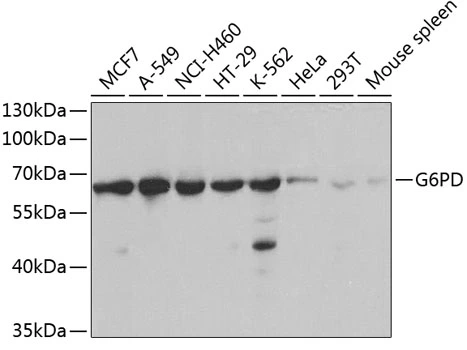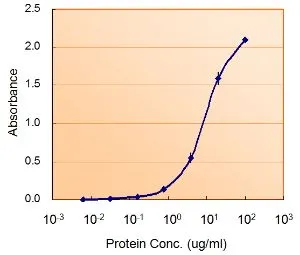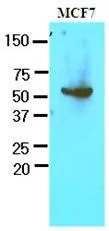
WB analysis of various sample lysates using GTX55630 G6PD antibody. Dilution : 1:1000 Loading : 25microg per lane
G6PD antibody
GTX55630
ApplicationsWestern Blot
Product group Antibodies
ReactivityHuman, Mouse
TargetG6PD
Overview
- SupplierGeneTex
- Product NameG6PD antibody
- Delivery Days Customer9
- Application Supplier NoteWB: 1:500 - 1:2000. *Optimal dilutions/concentrations should be determined by the researcher.Not tested in other applications.
- ApplicationsWestern Blot
- CertificationResearch Use Only
- ClonalityPolyclonal
- ConjugateUnconjugated
- Gene ID2539
- Target nameG6PD
- Target descriptionglucose-6-phosphate dehydrogenase
- Target synonymsCNSHA1, G6PD1, glucose-6-phosphate 1-dehydrogenase, epididymis secretory sperm binding protein
- HostRabbit
- IsotypeIgG
- Protein IDP11413
- Protein NameGlucose-6-phosphate 1-dehydrogenase
- Scientific DescriptionThis gene encodes glucose-6-phosphate dehydrogenase. This protein is a cytosolic enzyme encoded by a housekeeping X-linked gene whose main function is to produce NADPH, a key electron donor in the defense against oxidizing agents and in reductive biosynthetic reactions. G6PD is remarkable for its genetic diversity. Many variants of G6PD, mostly produced from missense mutations, have been described with wide ranging levels of enzyme activity and associated clinical symptoms. G6PD deficiency may cause neonatal jaundice, acute hemolysis, or severe chronic non-spherocytic hemolytic anemia. Two transcript variants encoding different isoforms have been found for this gene. [provided by RefSeq, Jul 2008]
- ReactivityHuman, Mouse
- Storage Instruction-20°C or -80°C,2°C to 8°C
- UNSPSC12352203




![ELISA analysis of antigen using GTX60515 G6PD antibody [5E12]. Black : Control antigen 100ng Purple : Antigen 10ng Blue : Antigen 50ng Red : Antigen 100ng](https://www.genetex.com/upload/website/prouct_img/normal/GTX60515/GTX60515_20170912_ELISA_w_23061123_905.webp)
![ELISA analysis of antigen using GTX60518 G6PD antibody [2H7]. Black : Control antigen 100ng Purple : Antigen 10ng Blue : Antigen 50ng Red : Antigen 100ng](https://www.genetex.com/upload/website/prouct_img/normal/GTX60518/GTX60518_20170912_ELISA_w_23061123_476.webp)

